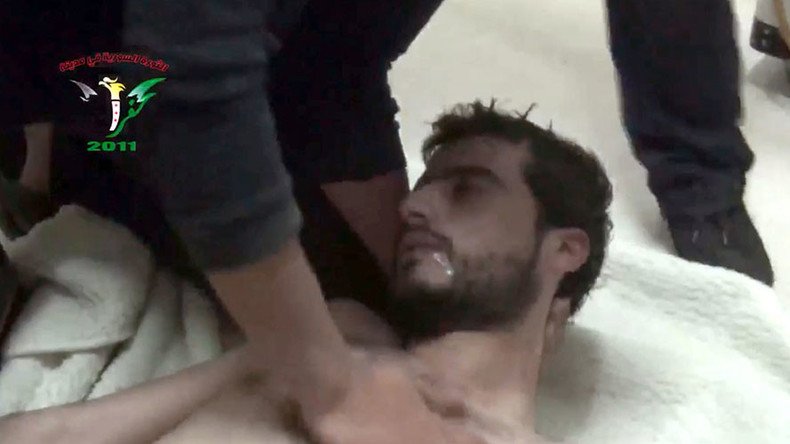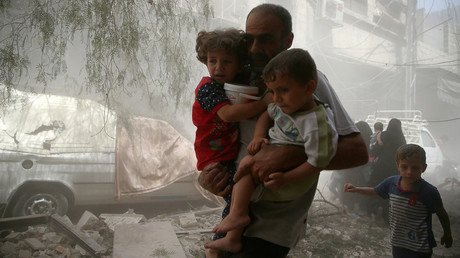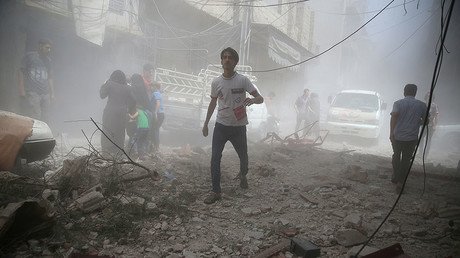UN report on Syria chemical attacks lacks proof to pin blame or introduce sanctions – Moscow

The findings of the latest UN report that blamed Damascus for the use of chlorine in several chemical attacks in 2014 and 2015 lack specifics, while some of the evidence might have be fabricated by opposition and terrorist groups, Russia’s envoy told UNSC.
“Already at this stage, we have a number of questions regarding the findings of the OPCW-UN Joint Investigative Mechanism on some cases. Evidence provided in the report gives rise to serious doubts. It could have been fabricated by the forces opposed to Damascus and terrorist groups, perhaps not without outside help,” Moscow’s Vitaly Churkin told a closed-door meeting of the UN Security Council. His speech was circulated by the Russian permanent mission.
Last week the UN Organization for the Prohibition of Chemical Weapons (OPCW) published an inquiry dealing with nine attacks in seven areas of Syria. Eight of the cases involved the use of chlorine. The inquiry was unable to reach a conclusion in six cases but attributed at least two attacks to government forces.
The report claimed that there was sufficient data to conclude that Syrian Arab Air Force helicopters dropped chemical weapons on Talmenes on April 21, 2014, and Sarmin on March 16, 2015.
Following the report, UNSC members have been debating whether to introduce additional charges on Syria given the fact that Damascus agreed to destroy its chemical weapons stockpiles in 2013 when it signed the 1997 Chemical Weapons Convention under a deal brokered by Russia and the US. If Syria did indeed violate the Chemical Weapons agreement, the UN will be forced to impose sanctions under Chapter seven of the UN Charter.
But the Russian envoy to UN challenged the findings, claiming that findings are based on a single factor, namely which side had the capability to use aviation for the chemical weapons drop.
The document states that the investigators “did not find evidence that the armed opposition has used helicopters during the incident,” Churkin said. “From the wording, we can conclude that there is no direct evidence to the contrary – that the opposition did not use helicopters.”
Furthermore, Churkin noted that report also stated that rebels managed to capture an airfield which had nine combat ready helicopters, which could have been used by rebels who have necessary technical skills and training to operate the machines.
“It is not clear why the authors of the report questioned the existence of such ‘levels’ [of technical knowledge] in well-trained” militants that also could come from abroad, the diplomat noted.
Churkin also noticed that the authors of the report virtually recognized themselves the “ambiguity of the available evidence” by resorting to using a language filled with “assumptions, rather than stating clearly established facts".
Earlier in the day Syria’s Permanent Representative to the UN, Bashar Jaafari, told reporters that UN report was based on the witness testimonies provided by the armed terrorist groups. Furthermore, the Syrian diplomat accused the findings of lacking any actual evidence based on sample analysis and medical reports.
“In light of the lack of reliable evidence the Syrian authorities consider it appropriate to continue the thorough examination of the incidents in Talmenes and Sarmin” to establish facts, Churkin said.
#Churkin: #JIMreport did confirm that ISIL has used chemical weapons in #Syriapic.twitter.com/fBpDbjcVKg
— Russian Mission UN (@RussiaUN) August 31, 2016
Following the closed door UNSC meeting Churkin told reporters that there are a number of questions which have to be clarified before Russia will accept all the findings and conclusions of the report.
“Clearly, there is a smoking gun. We know that chlorine most likely has been used — that was already the finding of the fact-finding mission before — but there are no fingerprints on the gun,” Churkin said following the closed-door session.
“There is nobody to sanction in the report which has been issued,” he said. “It contains no names, it contains no specifics. ... If we are to be professional we need to question all the conclusions.”














